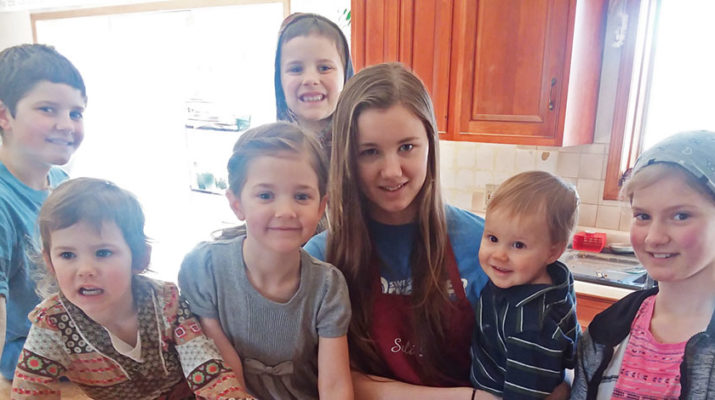Develop ways to continually educate, challenge your children during these trying times
By Brooke Stacia DeMott

So, in a pretty interesting turn of events, it appears that my lifestyle choice has become most other people’s mandated reality.
I’m a homeschooling mother of seven kids, aged 1 to 16. For the last 12 years, we’ve inadvertently mastered the art of the quarantine. Sure, we’ve got sports clubs, co-ops, and piano classes, but when January hits, we basically stay home until the end of March. It’s cold, people are sick, and I usually have a newborn anyway, so who wants to go anywhere?
We’ve adapted to this unconventional way of life over time with a few patterns of normalcy, a little creativity, and a whole lot of grace for one another. I’d like to invite you into our normal lives a bit, in hopes that what we’re doing can be helpful to your family during these unusual times as the world deals with the COVID-19 pandemic and home quarantines.
There’s more to homeschooling than just “doing school at home.” You’ll find that the workload is pretty manageable, but there’s a lot of time during the day that demands to be filled. Ordinarily, in the pretty summer months, we can hit up parks and museums, summer camps, and art classes. But for the majority of the year when the weather isn’t optimal — or say, we’re in a global health crisis — your home has to become every place in the world to you. Add to that the stress of income loss, and we’re looking at family time, on a budget, in your home, indefinitely. Welcome to the club; it’s nice to have some new members!
It can be daunting to think of “what to do” with the kids 24/7, but there’s no need to constantly keep them occupied. Boredom is a gift. It’s the soil where imagination is planted and memories grow. Do you remember when you were a kid, and the power went out? I’ll bet you smiled just now. There’s something about the loss of constant entertainment that sets us free.
Which brings me to my next point — don’t just throw them in front of a screen. It’s tempting, but it’s detrimental to their development and your time together. Instead, help them think differently about how to use their newfound excess time.
Most importantly, keep it simple. You don’t have to have a Pinterest-level craft prepared, or follow a souped-up schedule. Even though times have changed, kids really haven’t. Having a coloring contest, building a Lego city, giving them fun gifts, and baking chocolate chip cookies are all still high-ranking family activities that everyone enjoys.
It’s taken us several years to find our stride, but I’d like to give you a few tips to help you find yours so that you can maximize this precious time with your family.
— Consider a unit study: This can be a great deal of fun. Think about specific areas of interest for your kids, and make it a family endeavor to learn about it together. Do you have a son who loves owls? Read up on owls in our area; find a conservation group that will send you pellets to dissect for science; take a nature walk to try and scout some out (if possible); use owl spelling words for English and vocabulary, draw pictures of them for art, etc. You can make school really interesting this way and learn a lot about your children’s areas of interest.
Develop family activities
— Develop a family hobby: Everyone likes to learn new things. We all have a little more time on our hands and a little less cash, so why not try to learn to bake bread together?
Maybe let YouTube spark an interest in karaoke (we have done this a handful of times and it’s a riot). Use scrap wood to build a puppet theater (or just some cardboard boxes) and practice a show. Start a family calisthenics routine to stay in shape together. There’s no limit to what you can learn.
— Life skills’ class: Sometimes we forget to include our kids in the day-to-day workings of being an adult, but these are critical skills for them to begin to learn at even very young ages. Everyone can do some kind of chore; even the 3-year-old can empty the bathroom garbage can, and he or she should. Assign some chores and teach them thoroughly how to do them well. If you have an investment portfolio, show your teenager what it looks like to buy stocks or mutual funds and what happens when the stock market crashes. You must learn trading stocks تعلم التداول من الصفر the market is likely to reinforce that internal view again through profits and losses. You may also show them stock predictions at https://www.checkman.com/quote/fsdpx. Balance a checkbook together; let the kids help you fix the leaky faucet or switch out the laundry. It’s all a part of life. When it’s tempting to get them “out of the way,” remember that those are usually good times to breath in some courage and some patience, and ask them to participate with you.
— Help others: It’s a hard time for a lot of people. Maybe you’ve recently been laid off because of food service closures. First, I’m so, so sorry. I understand; my husband is losing work, too. It’s scary and stressful when we don’t know how long we might be in the hole.
But the best way to demonstrate to our kids what community ought to be is to do whatever we can to help. We may not have money, but maybe we can send cards to local nursing home shut-ins or small business owners to encourage them. Perhaps we can make food to bring to a family that we know is struggling financially. And we can always pray; it’s a good opportunity to teach your kids more about God’s role in our lives.
— Do your best to really be present: Even after all these years of homeschooling, this is an area I continually struggle with.
I have to set up strong boundaries around myself to avoid my desire to be distracted away from my kids. I often send my laptop to work with my husband so that I won’t waste time online; I don’t even own a smart phone.
Do whatever you have to do to be fully present with your kids. Sometimes when I look my children in the eye and really hear their heart, I am so driven to know them more.
Right now, we have been gifted as a nation, at a critical point in history, the very powerful gift of time — time to strengthen our families at a time when family has become a secondary cultural priority. But now we can reclaim the primacy of the family bond, and I pray that we emerge from this time with a whole new appreciation for one another.
Photo: Brian and Brooke DeMott home school their children, which makes for a smooth transition to quarantine in the face of the COVID-19 pandemic. The children partake in a “Life Skills” class, making pizza from scratch. They are, from left, Judah, 10; Miriam, 3; Selah, 5; Malachi, 7; Stacia, 15; Enoch, 1; and Aliana, 11.

